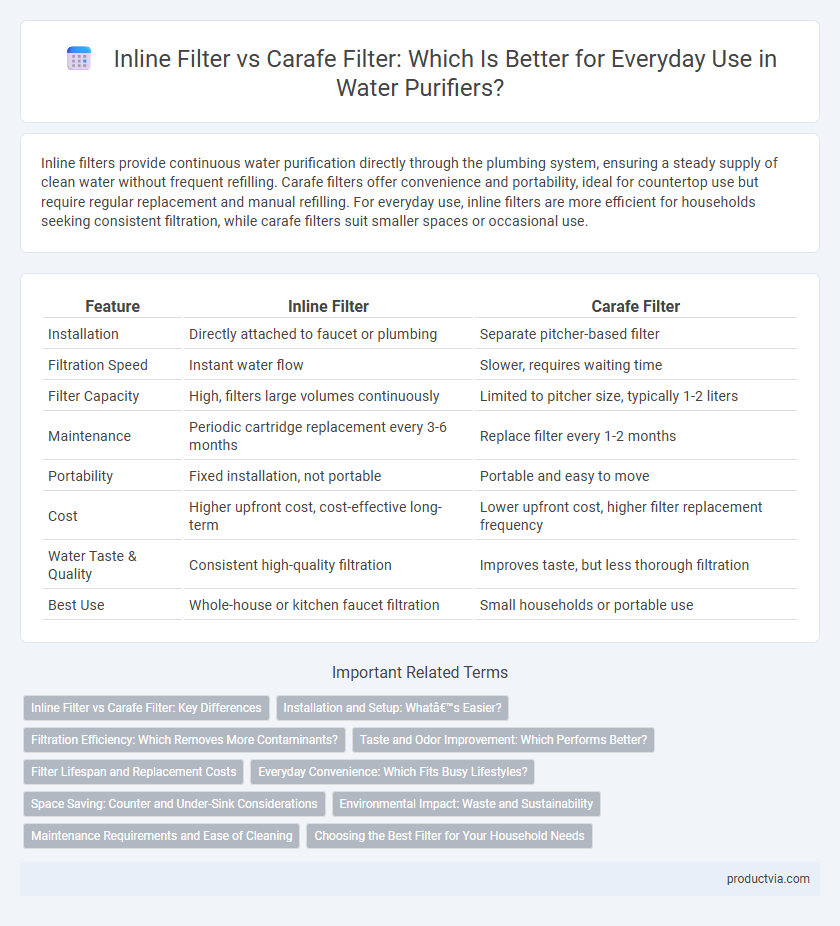Inline filters provide continuous water purification directly through the plumbing system, ensuring a steady supply of clean water without frequent refilling. Carafe filters offer convenience and portability, ideal for countertop use but require regular replacement and manual refilling. For everyday use, inline filters are more efficient for households seeking consistent filtration, while carafe filters suit smaller spaces or occasional use.
Table of Comparison
| Feature | Inline Filter | Carafe Filter |
|---|---|---|
| Installation | Directly attached to faucet or plumbing | Separate pitcher-based filter |
| Filtration Speed | Instant water flow | Slower, requires waiting time |
| Filter Capacity | High, filters large volumes continuously | Limited to pitcher size, typically 1-2 liters |
| Maintenance | Periodic cartridge replacement every 3-6 months | Replace filter every 1-2 months |
| Portability | Fixed installation, not portable | Portable and easy to move |
| Cost | Higher upfront cost, cost-effective long-term | Lower upfront cost, higher filter replacement frequency |
| Water Taste & Quality | Consistent high-quality filtration | Improves taste, but less thorough filtration |
| Best Use | Whole-house or kitchen faucet filtration | Small households or portable use |
Inline Filter vs Carafe Filter: Key Differences
Inline filters connect directly to your water supply, providing continuous filtration with consistent flow and are ideal for whole-house or under-sink use. Carafe filters operate by holding water in a container, filtering it as it sits, which suits small household needs but offers limited capacity and slower output. Inline filters generally deliver higher filtration efficiency and longer lifespan compared to carafe filters, which require frequent refills and filter changes.
Installation and Setup: What’s Easier?
Inline filters offer a straightforward installation process by connecting directly to your existing plumbing, requiring minimal tools and professional help for most models. Carafe filters, on the other hand, necessitate no installation as they function as standalone units, making setup as simple as filling the container with tap water. For everyday use, carafe filters typically provide the easiest and quickest setup, especially for users without plumbing experience.
Filtration Efficiency: Which Removes More Contaminants?
Inline filters typically offer higher filtration efficiency by removing a broader range of contaminants such as chlorine, heavy metals, and sediment compared to carafe filters, which mainly target chlorine and improve taste. Inline filters are integrated directly into the water supply, enabling continuous filtration and maintaining consistent water quality for everyday use. Carafe filters rely on gravity and have slower filtration rates, potentially allowing some impurities to pass through, making inline filters more effective for comprehensive contaminant removal.
Taste and Odor Improvement: Which Performs Better?
Inline filters typically deliver superior taste and odor improvement by directly treating water as it flows through the plumbing system, effectively reducing chlorine and organic compounds. Carafe filters improve taste by filtering water on demand but may allow some contaminants to remain due to slower filtration speeds and limited capacity. For everyday use, inline filters generally provide more consistent and noticeable enhancements in water flavor and odor quality.
Filter Lifespan and Replacement Costs
Inline filters typically offer a longer lifespan, lasting up to 6 months or 1,000 gallons, which reduces the frequency of replacements and lowers long-term costs. Carafe filters generally require replacement every 30 to 60 days, leading to higher cumulative expenses over time. Choosing an inline filter is more cost-effective for everyday use due to its extended durability and fewer replacement expenses.
Everyday Convenience: Which Fits Busy Lifestyles?
Inline filters integrate directly into your water supply, providing continuous filtration without the need for regular refilling, ideal for busy households seeking hands-free water purification. Carafe filters require manual refilling and offer portability but may interrupt daily routines due to limited capacity and frequent maintenance. For everyday convenience, inline filters deliver seamless, consistent clean water, fitting perfectly into fast-paced lifestyles that demand efficiency.
Space Saving: Counter and Under-Sink Considerations
Inline filters installed under the sink save valuable counter space, making them ideal for kitchens with limited surface area. Carafe filters, while portable and convenient for countertop use, occupy more space and require frequent refilling. For space optimization, under-sink inline filters provide a discreet and efficient solution without cluttering kitchen counters.
Environmental Impact: Waste and Sustainability
Inline filters generate less plastic waste compared to carafe filters due to their longer lifespan and fewer replacement cartridges needed. Carafe filters often rely on single-use plastic housings, increasing landfill contributions and environmental footprint. Choosing inline filtration systems supports sustainability by reducing overall waste and resource consumption in daily water purification.
Maintenance Requirements and Ease of Cleaning
Inline filters in water purifiers generally require less frequent replacement and simpler maintenance due to their integration within the plumbing system, reducing manual handling. Carafe filters, while easy to clean and replace, demand regular disassembly and careful cleaning to prevent mold and bacterial buildup on the filter and container surfaces. Users prefer inline filters for low-maintenance continuous filtration, whereas carafe filters suit those valuing simple, hands-on cleaning routines.
Choosing the Best Filter for Your Household Needs
Inline filters provide continuous filtration directly within the plumbing system, delivering purified water to multiple outlets throughout the household, ideal for large families or heavy water users. Carafe filters offer portable, countertop convenience by filtering water stored in a container, best suited for smaller households or occasional use. Choosing the best filter depends on factors such as water consumption levels, installation preferences, and space availability.
Inline Filter vs Carafe Filter for everyday use Infographic

 productvia.com
productvia.com